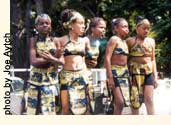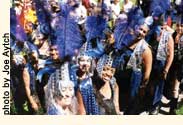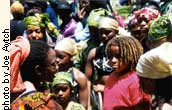 Oakland's Carajama 2001
|
Having never traveled abroad, I had little if any idea of the popularity of Carnival celebrations in the rest of the world. From Finland to Belize, and everywhere in between, Carnival, a holiday that has its roots in the season of spring and Christian repentance has become a phenomenal world class party.
When I traveled to Brazil, I realized that during the month of February, every major city, resort, shanty town and mud hut in Brazil celebrates Carnival. The crowded narrow streets of Orinda (a small town near the northern city of Recife), packed with swarming gyrating intoxicated revelers, stuffed people in like sardines, from block to block each crammed with soundsystems. The blaring collage of music was almost disorienting as people displayed costumes from the creatively bazaar to the culturally significant.
The Original Spring Fling
Homo Sapiens have celebrated the arrival of spring since the beginning of time. As Christians spread the gospel of Christ throughout the world, they wisely chose to incorporate the indigenous celebrations of new cultures with the Christian season of Lent, rather than try to abolish them.
The forty days before Resurrection Sunday (the day the crucified Jesus rose from the dead) is the season of Lent. It is a time when Christians are to turn or recommit their lives to Christ. In Lent one is to take responsibility for and seek repentance for sinful acts and thoughts. It is a time to give up something (traditionally, meat) during a period of fasting. It is a time of prayer, and spiritual growth. The season of Lent begins Ash Wednesday, and Carnival begins the Tuesday before, known as Fat Tuesday.
 Oakland's Carajama 2001
|
As Carnival celebrations migrated around the world, host countries began to introduce their own indigenous cultures and activities into the celebrations.
In New Orleans, Mardi Gras (Fat Tuesday translated from the French) celebrations feature Jazz. In Brazil the celebrations mix Portuguese and Amazon culture, Mexican heritage is highlighted in San Francisco, and in Oakland, California, Carajama features soul food. They all feature scantly clad dancers in colorful and extravagant costumes, living the life fantastic, gyrating to African influenced drumming and other exotic music from around the world.
Carnival Bay Area 2001
 Oakland's Carajama 2001
|
San Francisco Carnaval on Memorial Day Weekend, has been held in the Mission district since the late 70s, and is fondly referred to as the Boulevard of Dreams or the Mission Miracle Mile. It has become the West Coast’s largest Carnival celebration.
The current parade organizer is the Mission Economic Cultural Association (MECA), and the parade has been shortened from two days to one. The parade features floats, marching bands, music and hundreds of costumed dancers. Recently the event has been threatened by lack of media coverage, sponsorship and heightened neighborhood gentrification.
Mas Groups, as the costume bands are called, can consist of hundreds of dancers wearing costumes that maintain a common theme.
D’Midas International, a mas group led by Trinidad & Tobago (T&T) immigrants Tomi Seon and Debra Hosam has won more first place awards than any other Caribbean-themed mass. D’Midas has been a featured performer at the south bay’s popular Afribbean Festivals since 1993, and has performed in other festivals throughout the Bay Area. Their theme this year is “Dynasties in D’Desert.” Visit their website at www.dmidasinternational.homestead.com
Fogo na Roupa, led by Carlos Aceituno is another top group that always impresses. This group is about percussion, drums, dance, Capoeira, beautiful women and incredible costumes. Voted best Brazilian Contingent ’90, ’91, ’94, ’99 and ’00, this group is always in contention. Offering music and dance classes featuring Afro-Brazilan, Latin, Jazz, modern & African cultures, this group is second to none. Visit their website at www.gofogo.com or for more information call (510) 464-5999.
Mas Makers Massive, led by bandleaders Coleen and Stephen Tiffenson is another local powerhouse. Their expertise is respected locally and well known in New York, Miami and Trinidad. Don’t miss their pre-Carnival parties: Saturday, May 12th @ The Island Paradise in Alameda, Sundays, May 6th, 13th & 20th “Caribbean Men Can Cook” Lime at the Mas Camp 3pm-10pm, 5425 Ygnacio Ave., Oakland. For more information call (510) 534-6331.
All Ah We is all about “Building Bridges Through Culture” This tax exempt, non-profit arts organization is a rich celebration of Caribbean culture. Their Carnival theme for 2001 is “A Tribute to Ol’ Mas” featuring traditional masquerade characters and the live music of the Jamabalassie Orchestra. For more information visit their website at http://www.allahwe.org.
Aquarela Dance Group is Brazil personified. Led by choreographer and director Maria de Souza this relatively small group of women have taken Carnival and the surrounding community by its imagination since it inception a few years ago with fantastic costumes, incredible dance routine and pure unadulterated energy. Did I mention beautiful women representing the four corners of the world? Visit their website at http://www.aquarela.com
For more on SF Carnival and Oakland’s Carajama celebrations visit these websites:
http://www.latinoartsctr.citysearch.com (Mission Cultural Center)
http://sss.console.net (Super Sonic Samba)
http://www.dancemission.com (Dance Mission)
http://www.sambadocoracao.com (Samba do Coracao)
http://www.dezyn.com/paco/carnival





